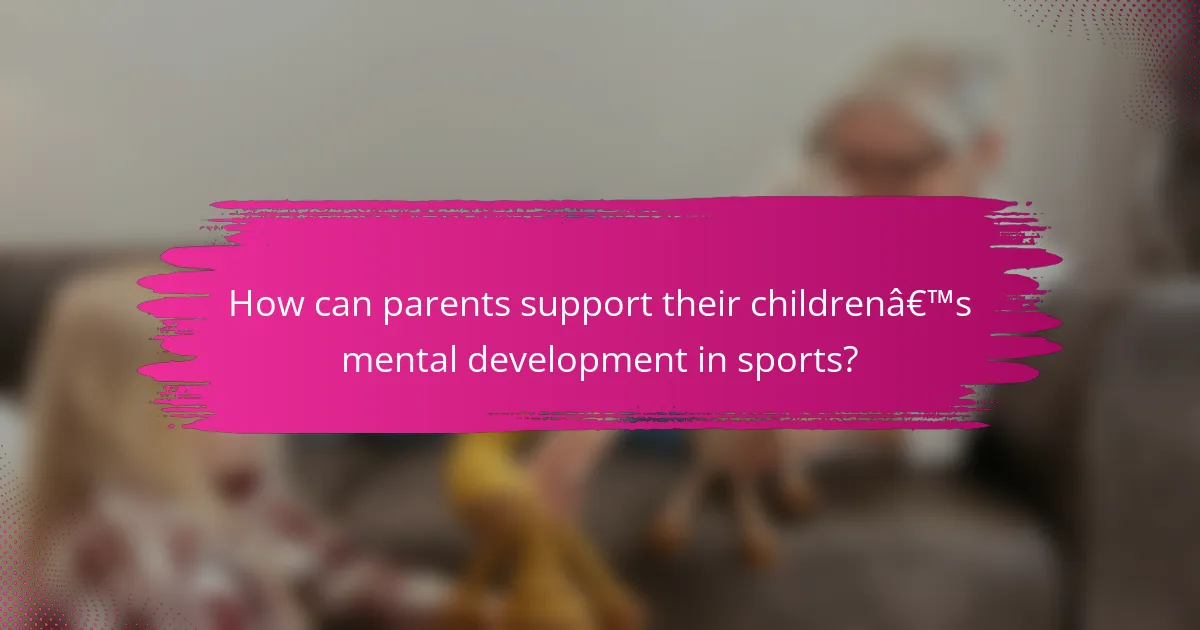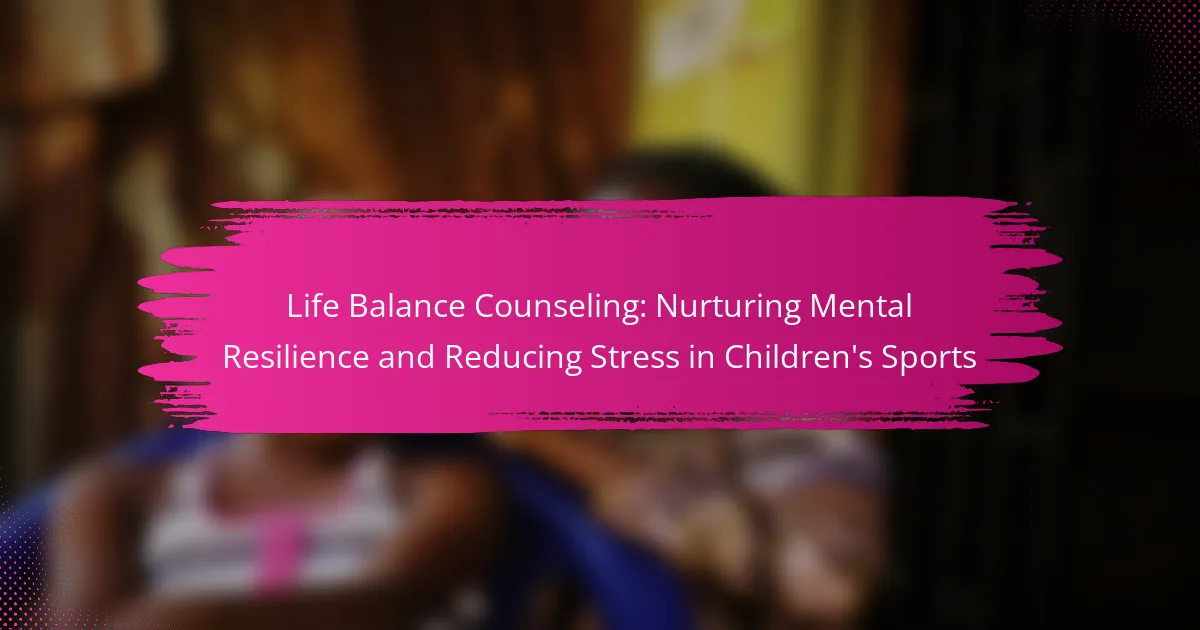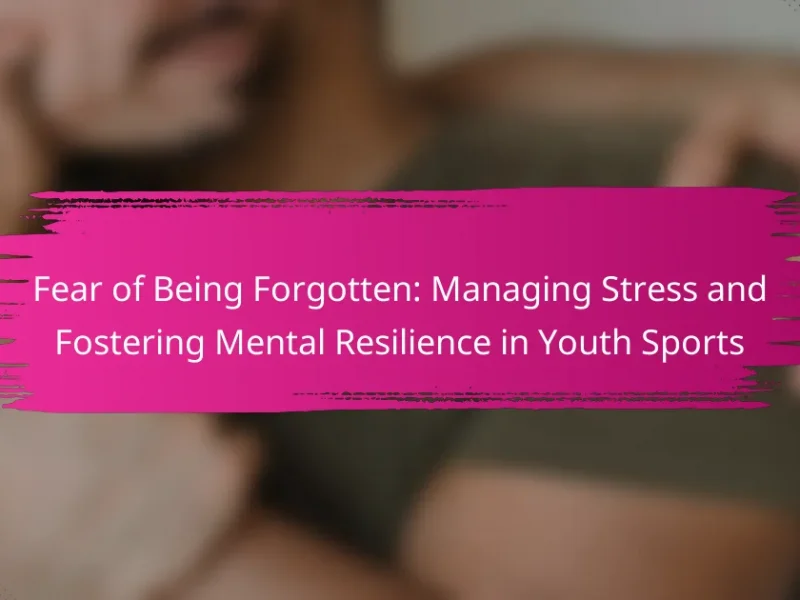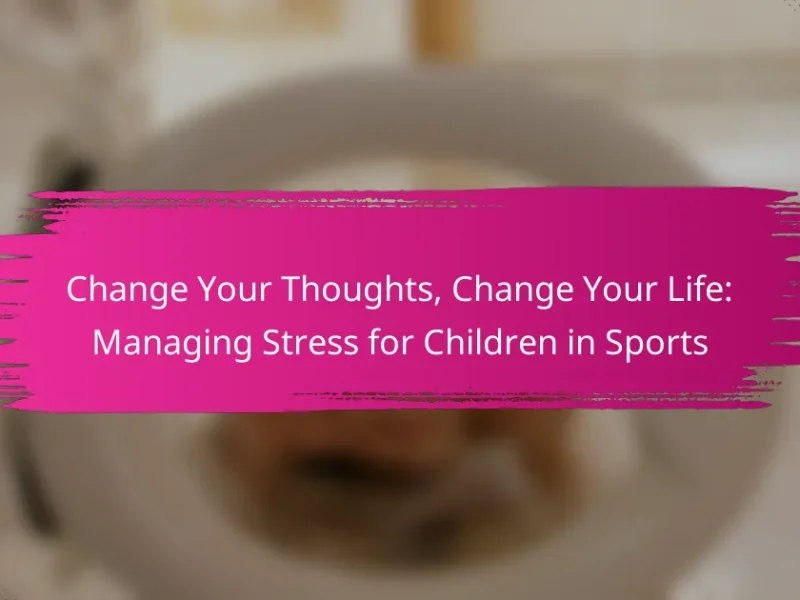Balancing sports and mental well-being is crucial for young athletes. Life balance counselling nurtures mental resilience and reduces stress through personalised coaching, mindfulness techniques, and family involvement. This approach enhances focus, fosters emotional stability, and promotes healthy communication. Effective strategies address performance anxiety and help children navigate challenges in sports and life.

What is Life Balance Counselling in Children’s Sports?
Life balance counselling in children’s sports focuses on nurturing mental resilience and reducing stress. This approach helps young athletes manage their emotional well-being while participating in sports activities. By integrating techniques such as mindfulness and stress management, counsellors enable children to cope with competitive pressures. This support fosters a healthier attitude towards sports, enhancing performance and enjoyment. Research indicates that children who receive life balance counselling show improved focus and reduced anxiety during competitions.
How does Life Balance Counselling support mental resilience?
Life Balance Counselling enhances mental resilience by providing strategies to manage stress and emotional challenges in children’s sports. It fosters coping skills, promotes positive self-talk, and encourages emotional expression. These elements help children navigate competitive environments, reducing anxiety and improving performance. Additionally, Life Balance Counselling emphasises goal-setting and mindfulness, which are vital for maintaining focus and resilience under pressure. By integrating these practices, children develop a stronger mental framework, enabling them to thrive both in sports and daily life.
What role does counselling play in reducing stress for young athletes?
Counselling significantly reduces stress for young athletes by enhancing mental resilience. It provides coping strategies, emotional support, and fosters a balanced perspective on competition. Counselling sessions often focus on stress management techniques, helping athletes navigate the pressures of performance. Research indicates that athletes who engage in counselling report lower anxiety levels and improved overall well-being.

What are the universal benefits of mental development in children’s sports?
Mental development in children’s sports fosters resilience, enhances focus, and reduces stress. These benefits contribute to overall life balance, promoting emotional stability and improved performance. Engaging in sports cultivates teamwork and social skills, vital for personal growth. Additionally, mental resilience gained through sports prepares children to face challenges in various life aspects.
How does mental development enhance performance in sports?
Mental development significantly enhances performance in sports by fostering mental resilience and reducing stress. Life balance counselling equips children with coping strategies, improving focus and emotional regulation. This leads to better decision-making and performance under pressure. Studies show that athletes with strong mental skills demonstrate increased confidence and motivation, contributing to overall success in their sports endeavours.
What impact does mental development have on emotional well-being?
Mental development significantly enhances emotional well-being by fostering resilience and coping strategies. Children engaged in sports experience improved self-esteem and emotional regulation, which are crucial for their overall mental health. Research shows that physical activity promotes the release of endorphins, reducing stress and anxiety. Additionally, participation in team sports cultivates social skills, providing a support network that further bolsters emotional stability. Thus, nurturing mental resilience through sports can lead to substantial improvements in children’s emotional well-being.

What unique strategies does Life Balance Counselling offer?
Life Balance Counselling employs unique strategies that enhance mental resilience and reduce stress in children’s sports. These strategies include personalised coaching, mindfulness techniques, and family involvement. Personalised coaching tailors approaches to individual children’s needs, fostering a supportive environment. Mindfulness techniques teach children to manage anxiety and improve focus, leading to better performance. Family involvement ensures a holistic support system, enhancing communication and understanding. Together, these strategies create a comprehensive framework for nurturing mental well-being in young athletes.
How can visualization techniques improve athletic performance?
Visualization techniques significantly enhance athletic performance by improving focus, reducing anxiety, and fostering mental resilience. These techniques enable young athletes to mentally rehearse their skills, boosting confidence and motivation. Research shows that athletes who practice visualization can achieve better outcomes in competitions. For instance, a study found that mental imagery can improve performance metrics by up to 20%. Additionally, incorporating visualization into training routines helps children develop coping strategies for stress, enhancing their overall sports experience.
What are the advantages of mindfulness practices in sports?
Mindfulness practices in sports enhance focus, reduce anxiety, and improve emotional regulation. These advantages cultivate mental resilience in children, fostering a balanced approach to competition.
Incorporating mindfulness can lead to increased performance consistency and better stress management. Research indicates that athletes engaging in mindfulness report lower levels of performance anxiety, allowing for more effective coping strategies during competitions.
Additionally, mindfulness practices promote a positive mindset, which can enhance teamwork and communication among young athletes. These benefits contribute to a healthier sports environment, nurturing emotional well-being alongside physical development.
Overall, integrating mindfulness into children’s sports not only supports mental health but also enhances their overall sports experience, encouraging lifelong skills in resilience and balance.

What rare attributes contribute to effective counselling in sports?
Effective counselling in sports requires rare attributes such as empathy, adaptability, and cultural sensitivity. Empathy fosters trust between the counsellor and the child, enhancing communication. Adaptability allows counsellors to modify strategies based on individual needs, promoting optimal mental resilience. Cultural sensitivity ensures that counselling approaches respect diverse backgrounds, which is crucial for children’s engagement and understanding. These attributes collectively nurture a supportive environment, crucial for reducing stress in children’s sports.
How does personalised counselling differ from general approaches?
Personalised counselling focuses on individual needs, while general approaches apply broad strategies. Personalised counselling in life balance emphasises tailored techniques that nurture mental resilience in children involved in sports. This customisation addresses unique stressors and enhances coping mechanisms. General approaches may overlook specific emotional or psychological challenges faced by young athletes, reducing effectiveness. Personalised strategies lead to improved mental health outcomes and greater overall satisfaction in sports participation.
What innovative tools are used in Life Balance Counselling?
Life Balance Counselling utilises innovative tools like mindfulness apps, interactive workshops, and cognitive behavioural techniques. These tools enhance mental resilience and reduce stress in children’s sports through engaging and practical methods. For example, mindfulness apps provide guided exercises that help children manage anxiety during competitions. Interactive workshops foster teamwork and communication skills, essential for a balanced sports experience. Cognitive behavioural techniques allow children to reframe negative thoughts, promoting a positive mindset.

What challenges do young athletes face that counselling can address?
Young athletes face various challenges that counselling can effectively address, including stress management, performance anxiety, and balancing sports with academics. Counselling helps develop mental resilience, enabling athletes to cope with pressure and setbacks. It also fosters communication skills, enhancing relationships with coaches and peers. Additionally, counselling provides strategies to maintain a healthy life balance, ensuring that sports do not overshadow personal development.
How can stress manifest in young athletes?
Stress can manifest in young athletes through physical symptoms, emotional changes, and behavioural shifts. Common physical signs include fatigue, headaches, and sleep disturbances. Emotionally, they may experience anxiety, irritability, or a lack of motivation. Behaviourally, changes can include withdrawal from teammates, decreased performance, or increased aggression. Recognising these signs is crucial for parents and coaches to support mental resilience and ensure a balanced approach to sports.
What are common misconceptions about counselling in sports?
Many believe counselling in sports is only for those facing severe issues, which is a misconception. Counselling supports overall mental resilience and stress reduction in young athletes. It fosters emotional well-being and enhances performance, helping children balance sports and life. Another common myth is that counselling indicates weakness; in reality, it demonstrates strength and a proactive approach to mental health. Parents may also think counselling is unnecessary for their children, yet early intervention can prevent future challenges and promote healthy coping strategies.

How can parents support their children’s mental development in sports?
Parents can support their children’s mental development in sports by fostering a positive environment and encouraging healthy coping strategies. This includes promoting open communication about feelings and experiences in sports.
Establishing a balance between competition and enjoyment is crucial. Parents should emphasise the importance of effort over winning. This approach nurtures resilience and reduces stress, allowing children to focus on personal growth.
Additionally, parents can model effective stress management techniques, such as mindfulness exercises or relaxation strategies. These practices help children learn to navigate challenges in sports and life.
Finally, providing consistent encouragement and celebrating achievements, regardless of size, reinforces a child’s self-esteem and motivation. This supportive framework cultivates mental resilience essential for their overall development in sports.
What are effective communication strategies for parents?
Effective communication strategies for parents include active listening, clear expression of expectations, and fostering an open dialogue. These methods enhance understanding and build trust, essential for nurturing mental resilience in children involved in sports. Active listening allows parents to validate their child’s feelings, while clear expression helps set appropriate boundaries. Encouraging open dialogue can lead to discussions about stress management techniques, which are crucial for reducing anxiety in competitive environments.
How can parents encourage a healthy balance between sports and life?
Parents can encourage a healthy balance between sports and life by promoting mental resilience and stress management. Establishing clear priorities helps children understand the importance of both academics and athletics. Encouraging open communication allows children to express their feelings about sports commitments. Setting realistic expectations can reduce pressure and foster a love for the game. Additionally, modelling a balanced lifestyle demonstrates the value of managing time effectively. Engaging in family activities outside of sports reinforces the importance of diverse experiences.

What are the best practices for implementing Life Balance Counselling?
To implement Life Balance Counselling effectively, prioritise open communication and establish trust with children. Incorporate techniques that foster emotional awareness and resilience. Regularly assess individual needs and adapt strategies accordingly. Engage parents to create a supportive environment. Utilise interactive activities to promote engagement and understanding.
What steps should coaches take to integrate counselling into training?
Coaches should implement a structured approach to integrate counselling into training. Begin by training staff on mental resilience techniques. Incorporate regular mental health check-ins during practice sessions. Create a supportive environment that encourages open communication. Collaborate with mental health professionals to provide workshops or resources tailored for young athletes. This integration nurtures life balance and reduces stress effectively.
How can athletes apply counselling techniques in practice?
Athletes can effectively apply counselling techniques in practice to enhance mental resilience and manage stress. Techniques such as visualization, mindfulness, and cognitive restructuring help athletes maintain focus and cope with performance pressure. Regular practice of these techniques fosters a balanced mindset, enabling athletes to navigate challenges more effectively. Additionally, incorporating team discussions about mental health promotes a supportive environment, reinforcing the importance of mental well-being in sports.
What common mistakes should be avoided in counselling young athletes?
To effectively counsel young athletes, avoid common mistakes that can hinder their mental resilience and overall well-being. Focus on fostering a supportive environment, prioritising their mental health over performance, and encouraging open communication.
Common mistakes include:
1. Overemphasising competition: Prioritising winning can increase stress and diminish enjoyment.
2. Ignoring emotional needs: Failing to address feelings can lead to burnout and anxiety.
3. Lack of individualised support: Not recognising unique challenges faced by each athlete can hinder development.
4. Neglecting life balance: Over-scheduling can disrupt personal time and recovery.
By steering clear of these pitfalls, counsellors can nurture resilience and reduce stress effectively.
How can ongoing evaluation enhance the effectiveness of counselling?
Ongoing evaluation enhances the effectiveness of counselling by providing continuous feedback and adjustments. This process fosters a tailored approach, addressing the unique needs of children in sports, ultimately promoting mental resilience and reducing stress. Regular assessments allow counsellors to identify progress and challenges, ensuring strategies remain effective. As a result, children receive the support necessary to thrive in both sports and personal development.


